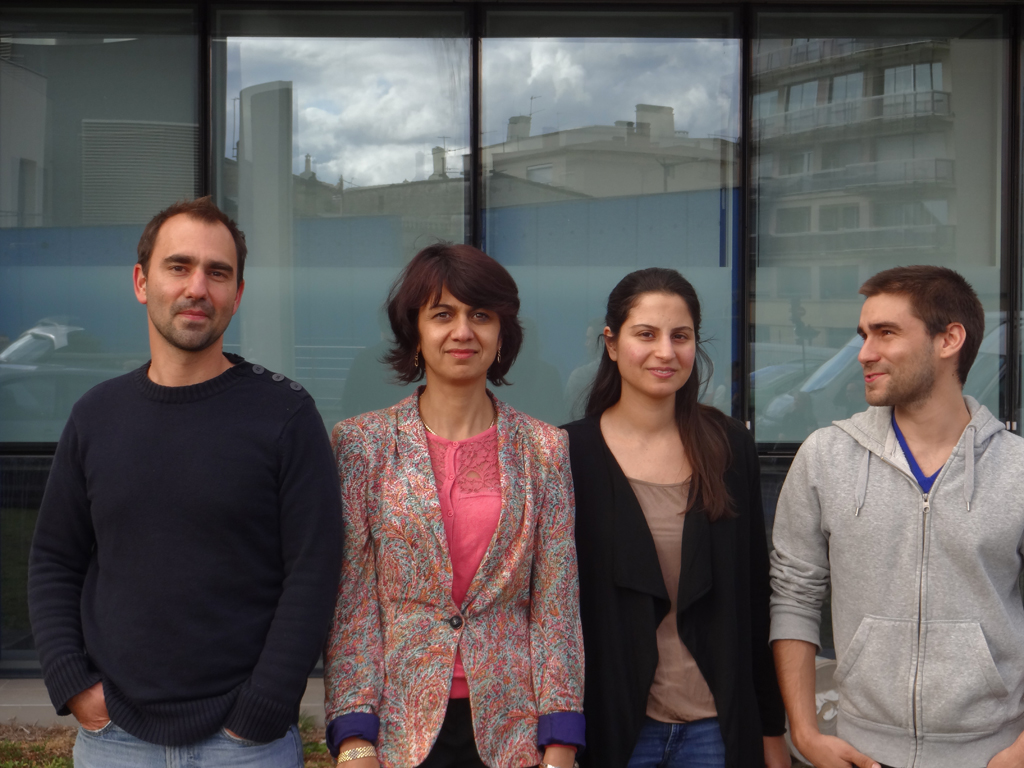Molecular regulation of autophagy in cancer cells
INSERM U916 VINCOInstitut Bergonié, 229, cours de l’Argonne
33076 Bordeaux Cedex France - Bordeaux
Site web - mojgan.mergny@inserm.fr -
Principal investigator
Mojgan Djavaheri-Mergny

Research themes
Autophagy, a lysosomal pathway used by the cell to degrade and recycle cytoplasmic constituents, is essential for several biological processes including cell survival, differentiation and immune responses. The aim of our group is to characterize the molecular interplay between autophagy and apoptotic cell death in cancer cells. Our previous studies provided evidence in favour of the regulation of autophagy by apoptosis-regulatory factors. On the one hand, we demonstrated that activation of NF-kappaB (which inhibits apoptosis) mediates the repression of autophagy in cancer cell lines (1,2). On the other hand, we provided evidence that p53, a pro-apoptotic transcription factor that is frequently deregulated in cancer cells, regulates autophagy (3). We also found that Beclin 1 (which is a key protein involved in the initiation of autophagy) is cleaved by caspases (4) and plays a survival role during granulocytic differentiation of acute myeloid leukemia cells (5).
The major ongoing projects are focused on leukemia and non-Hodgkin lymphoma pathologies. The current objectives are to:
- decipher the molecular events through which apoptosis and autophagy regulate each other.
- explore the functions of autophagy-regulatory proteins (Atg proteins) in resistance to anti-cancer therapies.
- elucidate the role of autophagy and Atg proteins during differentiation process of leukemia cells.
- identify and explain correlations between the regulation of autophagy and chemoresistance in tumour samples.
Understanding the molecular regulation of autophagy should yield important clues about autophagy’s role in chemoresistance and oncogenesis. We expect this work to lead to the development of new therapeutic approaches that may help in the treatment of cancers.
This work was supported by funds from the “Institut National de la Santé et de la Recherche Médicale” (INSERM), the University of Bordeaux, the Institut Bergonié, the “Conseil Regional d’Aquitaine”, the” Ligue contre le Cancer Comité de la Gironde”.
Descriptive figure

Publications
1. Djavaheri-Mergny M, Amelotti, M, Besançon, F., Bauvy, C., Souquère, S., Pierron, G. & Codogno, P. NF-kappa B activation represses TNF-alpha–induced autophagy. J. Biol. Chem. 2006; 281: 30373-82.
2. Trocoli A and Djavaheri-Mergny M. The complex interplay between autophagy and NF-kappaB signalling pathways in cancer cells. Am. J. Cancer Res. (2011) 1:629-649.
3. Lorin S, Borges A, Ribeiro Dos Santos L, Souquère S, Pierron G, Ryan, K.M, Codogno P and Djavaheri-Mergny M. JNKactivation is essential for DRAM-dependent induction of autophagy and apoptosis in 2-methoxyestradiol-treated Ewing sarcoma cells. Cancer Res. 2009 69, 6924-693.
4. Djavaheri-Mergny M, Maiuri MC & Kroemer G. Crosstalk between apoptosis and autophagy by caspase-mediatedcleavage of Beclin 1. Oncogene. 2010; 29:1717-9.
5. Trocoli A, Mathieu J, Priault M, Reiffers J, Souquere S, Pierron G, Besançon F & Djavaheri-Mergny M. ATRA-inducedupregulation of Beclin 1 prolongs the life span of mature Acute Promyelocytic Leukemia cells Autophagy. (2011) 7:1-7.
Composition de l'équipe
Paul Ben Sadoun, Ingénieur d’étude (INSERM)
Faten Merhi, Post-doctorante (Conseil régional d’Aquitaine)
Tomas Del Olmo, étudiant M2 (Université de Bordeaux)